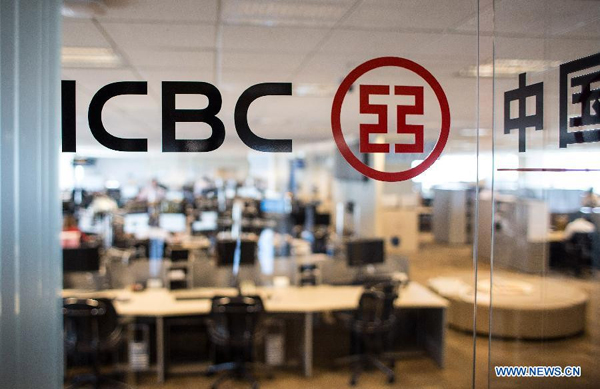Overseas businesses boost Chinese banks
(Xinhua) Updated: 2015-09-05 16:56
 |
|
A branch of Industrial and Commercial Bank of China. [Photo/Xinhua] |
BEIJING -- Interim reports of 16 A-shares listed Chinese banks posted slight profit growth, thanks to their overseas business offsetting the impact of the slowing domestic economy.
The net profits of China's largest State-owned banks expanded less than 1 percent in the first half (H1) this year, except for Bank of China (BOC), which saw 1.69 percent expansion.
Overseas commercial businesses of China Communication Bank (CCB) netted the bank 2.12 billion yuan ($332.92 million) in the January-June period, up 35.61 percent year on year.
The Agricultural Bank of China's (ABC) overseas branches reported net profits of 1.81 billion yuan, up 22.8 percent from a year ago.
The H1 pre-tax profits of BOC hit $4.65 billion and Industrial and Commercial Bank of China (ICBC) gained 13 percent to 1.71 billion yuan.
Yi Huiman, ICBC president, said the bank was increasing business abroad foreign to improve its global competitiveness.
The foreign capital market posed new challenges to the banks' overseas strategies, especially the fluctuating exchange rate, which affected the liquidity of yuan.
"Offshore renminbi liquidity will be improved as the currency goes global, and cross-border renminbi businesses remains heavyweight in the overseas sectors of Chinese-funded banks," said Mao Yumin, president of CCB (Asia), a CCB subsidiary.
BOC vice president Zhang Jinliang said banks should grasp the opportunity afforded by the recent changes to the yuan exchange rate, and establish offshore renminbi businesses.
According to interim reports, cross-border renminbi settlement by CCB hit 834.15 billion yuan, and BOC reported 2.63 trillion yuan. The total cross-border renminbi businesses of ICBC rose by 16.5 percent to 1.99 trillion yuan.
"Cross-border use of China's yuan is an irresistible trend," suggested Hu Zhanghong, executive president of CCB International, adding that the banking sector needed more overseas innovative businesses and better services for renminbi capital abroad.
Meanwhile, central policies like the Shanghai-Hong Kong Stock Connect will provide facilitate more renminbi business in Hong Kong.
"We take Hong Kong as a 'bridgehead' for our overseas businesses," said Chen Siqing, BOC's president. BOC (Hong Kong) has signed agreements or loan contracts with enterprises in free trade zones in Guangdong, Tianjin and Fujian, to launch direct yuan-denominated loans.
Many domestic enterprises with financing needs have filled for their IPOs in Hong Kong Exchanges as A shares IPOs had been suspended, and the market for yuan-denominated bonds has maintained momentum in Hong Kong since 2014 providing extra opportunities.
China's top securities regulator said on July 10 that it will continue with its approval procedures for IPOs, although it confirmed that there will be no IPOs in the near term.
- 2015 China International Fair for Investment and Trade kicks off in Xiamen
- China's commodity imports robust in Jan-Aug period
- China stocks rebound 2.92%
- 2015 China box office already past 2014 total
- China foreign trade decline widens in August
- Interview: JP Morgan's senior executive bullish on China
- Innovation, development the focus for NZ mayors
- Lives of freelancers

















